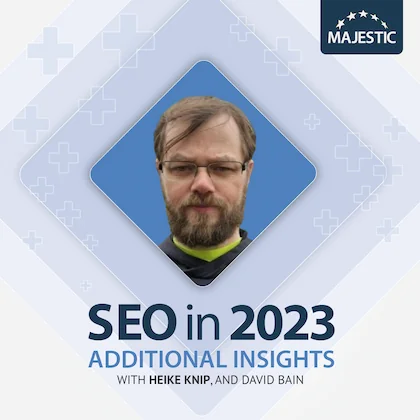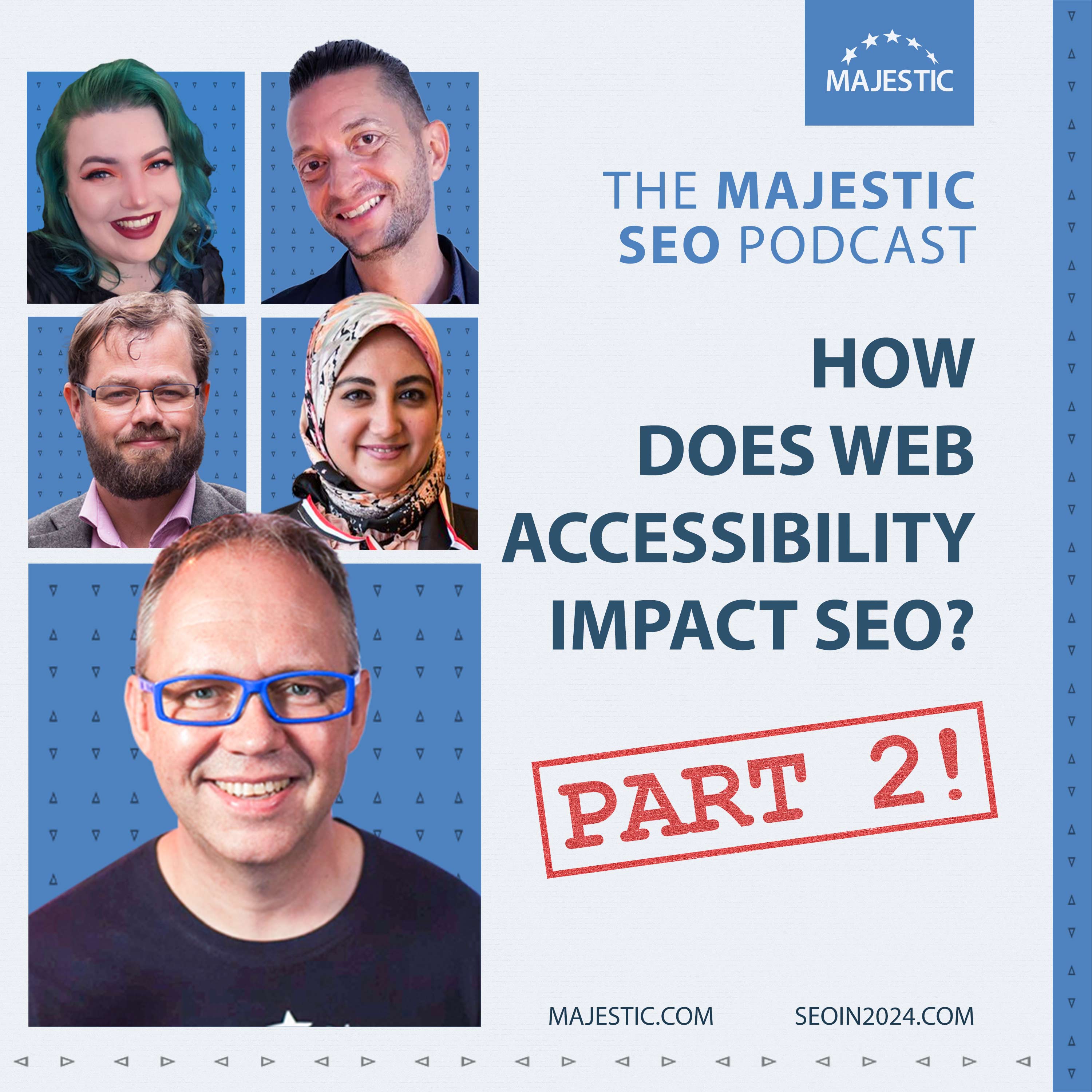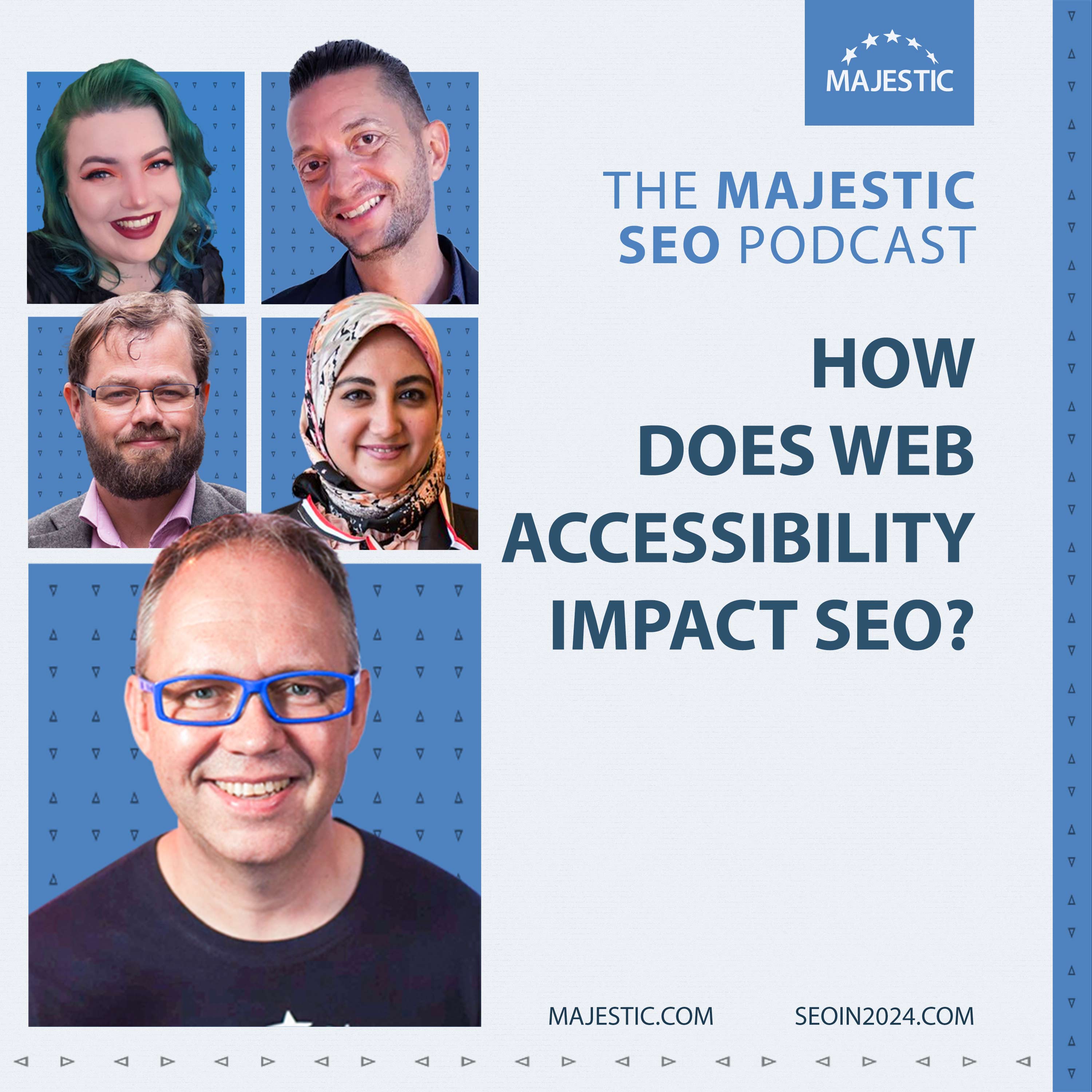-
Site Explorer
- Majestic
- Summary
- Ref Domains
- Backlinks
 New
New Lost
Lost- Context
- Anchor Text
- Pages
- Topics
- Link Graph
- Related Sites
- Advanced Tools
- Author ExplorerBeta
- Summary
- Similar Profiles
- Profile Backlinks
- Attributions
- Compare
-
Link Tools
- My Majestic
- Recent Activity
- Reports
- Campaigns
- Verified Domains
- OpenApps
- API Keys
- Keywords
- Keyword Generator
- Keyword Checker
- Search Explorer
- Link Tools
- Bulk Backlinks
- Neighbourhood Checker
- Submit URLs
- Experimental
- Index Merger
- Link Profile Fight
- Mutual Links
- Solo Links
- PDF Report
- Typo Domain
- Free SEO Tools
- Support
How Neurodivergent thinking can supercharge your SEO
Heike Knip
Heike Knip highlights how neurodivergent thinking can greatly amplify SEO efforts by offering a broader perspective, unconventional problem-solving, and the ability to recognize hidden opportunities that might go unnoticed by others.

Heike Knip says: “My additional insight for 2023 is how neurodivergent thinking can supercharge your SEO. I find it a really interesting subject because I myself am neurodivergent (I have ADHD, autism, and dyslexia). I think it supercharges your SEO because the way my brain works is different than let's say neurotypical people, so I look at the wider spectrum. If somebody comes to me with an issue or problem that their website is not ranking, I look at a variation of models and I think outside of the box. I also look at things where other people would probably not look at, like longtail keywords, user behavior, and other potential things we can work with. It really is about thinking outside of the box, because, like I said, most people will only see what they want to see, and they don't see other opportunities. What I do with my clients is I look at where the other markets. Sometimes I even advise a client to focus on a different area, because I see more possibilities within that sector than there are with that keyword, because of how people react to it. That's why I think with the way our mind is geared, I think a lot of SEOs in our industry are analytical and into data processing and I love it. For me it's ideal because you get to create more and create new things for people.”
If you're managing an SEO team to have people from many backgrounds, many perspectives, people who are neurodivergent and other people as part of your team to try and encompass lots of different perspectives in terms of what you should be doing, what should you should be aiming for?
“Let's say you have an inclusive and diverse team, you get more possibilities out of them, and you learn more about other cultures, and this can be quite useful within SEO, because different folks look at things differently. At the end of the day, SEO is just people looking up something online, and everybody does it different, but having somebody who's neurodivergent you, just comes up with different ideas and looks at things from different angles.”
Does it work the same way from your perspective? So does someone who is neurodivergent not necessarily pick up on what some might consider to be more standard viewpoints? From what a customer should be looking for, or how a website should be designed as well?
“Let me explain it like this, my brain looks at something from 400 million points of view. Let's say I wake up in the morning I'm already thinking 'Okay, I need to have a cup of coffee, I need to wash, I need to do this, I need to do that, etc, etc', whereas normal people will get up and say 'I would like to have this cup of coffee first.' For me, I have already gone through 40 or 50 different thinking processes it gets to 10 minutes later and I'm downstairs preparing my coffee. So from that point of view, we see many things and we come up with many ideas. I can filter certain ideas out because I know it's not feasible or it's not possible, or maybe the clients budget is not good enough, so I can make that judgment. But again, most of the ideas would be different than other people or I come up with 'oh, why didn't we look at it from this angle or from that angle?'”
So it sounds like it's wonderful trying to ensure that you've got someone who's neurodivergent as part of strategy and planning meetings?
“Oh, yeah, definitely for sure. The only thing that you need to look at, and this is more on a wider spectrum, how you communicate with them. Sometimes its just the way you communicate within your team with people that are neurodivergent. You need to also make sure that sometimes you give them one task at a time, you need to communicate in a clear direct way, and don't 'chatter around it' trying to make it sound nice, but just tell them what needs to be done with nothing else around it.”
Should neuodivergent people be telling their bosses, if they've got a boss, you'll help me by being more clear in what you're doing? Or is it responsibility of the SEO manager, if they're not the neurodivergent person, to actually understand that and to be more inclusive and they should be aware of that to begin with?
“I think both bodies need to be honest. Let's say if I go to work somewhere, then I will ask for reasonable adjustments where it is possible, and I'm quite clear in that I have ADHD, I have autism, etc, just to explain. I know certain employers will not pick me because of that, but from the emplyer side, you need to look if you can give these adjustments if possible, and they also need to be educated. Okay, how do we need to communicate as a coach, do we have somebody in place within the business to support our employees? Yes, reasonable adjustments are necessary but sometimes we need to also see it's not always possible, if you are in an old building, or if you work in a restaurant, there's not always a time for you to have room for yourself. However, that doesn't mean that employers shouldn't be offering these things. They need to do it, they need to be more inclusive, and be more aware about it. But that's why I say that its a two way street from both parties.”
Let's have a think about SEO careers for someone who's neurodivergent. Because someone who's neurodivergent may find that they're maybe stuck in an SEO executive type position, and they struggle to move forward. Perhaps it's because of unique communication or some perception from a manager. But how does someone who's new to divergent progress their SEO career more quickly? Are there any tips that you can give them to assist them along the way?
“Everybody's different so it will be different for everybody. Some people who are neurodivergent are not looking for a career. People used to tell me all the time that I need to make a career, but my focus is not making a career, I want to do something I enjoy that I can make a reasonable living from. Let's say that I can have the standard of living what I want, then you need to have a look within a company at how to facilitate this, because the mindset of somebody who is maybe neurodivergent is different than somebody who's neurotypical that wants to have this career ladder. So my tip is to have an open conversation with different people, what are there expectations, do they do they want to stay with us, are they happy, do they even want to go up the ladder? Then you can have a look at if they need coaching, support, mentorship? We have ADHD mentors and coaches to help you and improve and theres also schemes here in UK where you could get some Government funding to help you with certain things. You need to see this on a case by case basis, because something that will work for me would not work for somebody else. Some people are not eager to go through the career steps because people with ADHD are quite impulsive. We have a 300% more chance of starting a business than anybody else, and also changing it! Looking at myself, sometimes I'll get this idea and then start on it. It's a bit of a difficult question to answer with a simple answer, but the best way I would say is how can you best stimulate the person that is working with your company to progress? And I think this depends on what you can offer, it can be coaching, it can be training sessions, progress through a career to become better. Especially with hyperfocus or something, I can learn something within two months where it might take somebody else a year, but if I don't like it, then it will take me 20 years.”
I loved your phrase there, how can you stimulate someone to progress. You were talking about I think people in general, rather than people who are neurodivergent by saying, have a conversation with someone, get to know what they want to achieve as an individual. I remember being an SEO manager in the past, having conversations with the team on a regular basis, and understanding that not everyone wants to be an SEO manager or an SEO director, some people are quite happy being SEO executives, some people are quite happy, working in the industry, maybe for three years and then using that as a means to go and do something else in the future, and if you can get people to trust you to have open conversations with you about what they want to do, what paths they want to take, then hopefully you can motivate them more while they happen to be working in the environment that you're currently in.
“It is all about communication again, not only with people that are neurodivergent, but with the whole team, because if you have that open communication, and you stimulate them and get the best out of them, then whether or not they leave your company, they will leave happy, and be more likely to recommend you, or maybe even come back later. If people share their good experiences at a company, then you're more interesting for other people. It's a little bit off topic, but some people don't take note of how much they make or how much the company makes or what is career objectives, but instead they look at how well the company is taking care of the community, how well the company takes care of their staff and their team.”
So ask the question of what's important for you as well, and don't assume that everyone wants private health insurance, or gym membership or lunches every single day? You know, it could be something else that's that appeals to them?
“Definitely, for sure. That's another good example why you should neurodivergent people in your company because you start those conversations and look at different angles that you didn't even think about. This is the same with Keyword Research and SEO, just to get back a bit on topic, because we look at things so differently. It's like yeah, we go off track sometimes, but if we go off track with SEO, sometimes you come up with the best ideas. Most of the websites I work with grow quite quickly and work with me because I specialize in on-site SEO and technical SEO. One reason I don't like off-site SEO is because I am not a big fan of backlinks and it's not my 'cup of tea' and if I don't have focus on it, then I can't do it.”
Just to clarify though, you're not a big fan of backlinks, you do appreciate the value of backlinks, but you don't like reaching out to actually try and build backlinks?
“Backlinks are important, but because of my ADHD, I don't like outreach because I can't focus on it. But I do know a lot of people that can do great things with outreach.”
You've shared what SEOs should be doing in 2023. So now let's talk about what SEOs shouldn't be doing. What's something that's seductive in terms of time, but ultimately counterproductive? What's something that SEOs shouldn't be doing in 2023?
“I think what they shouldn't be doing is overthinking. I think a lot of people within SEO sometimes overthink things. I think they spend too much time looking at things that is not necessary. I know it's a bit of a wide subject, but I've seen it in the past where they focus too much on one point of the SEO and say 'oh, we want to see that keywords' and not looking at the bigger picture. So they get stuck in that and because of that, they don't see the opportunities around them. One of the things that I have noticed is that sometimes SEO, and even some brilliant SEOs, can take their eyes off the roadmap and just focus on one thing a day, without looking at the bigger picture. Sometimes you need to take a step back and look at the next day too.”
Heike Knip is the founder of The Good SEO Company, and you can find Heike over at thegoodseocompany.com.
Also with Heike Knip
Choose Your Own Learning Style
 Video
Video
If you like to get up-close with your favourite SEO experts, these one-to-one interviews might just be for you.
Watch all of our episodes, FREE, on our dedicated SEO in 2023: Additional Insights playlist.
 Podcast
Podcast
Maybe you are more of a listener than a watcher, or prefer to learn while you commute.
SEO in 2023: Additional Insights is available now via all the usual podcast platforms
 SEO in 2023
SEO in 2023
Catch up on SEO tips from 101 SEO experts in the original SEO in 2023 series
Available as a video series, podcast, and a book.
Could we improve this page for you? Please tell us







